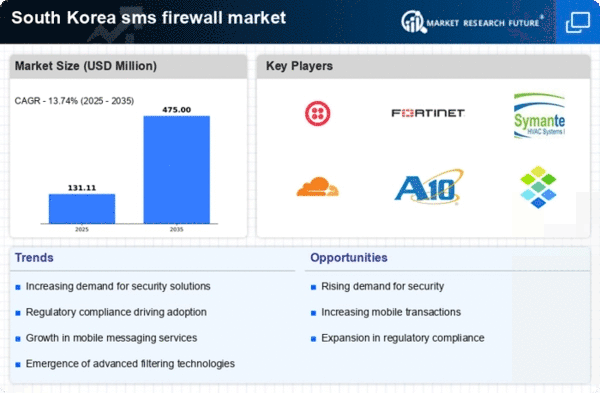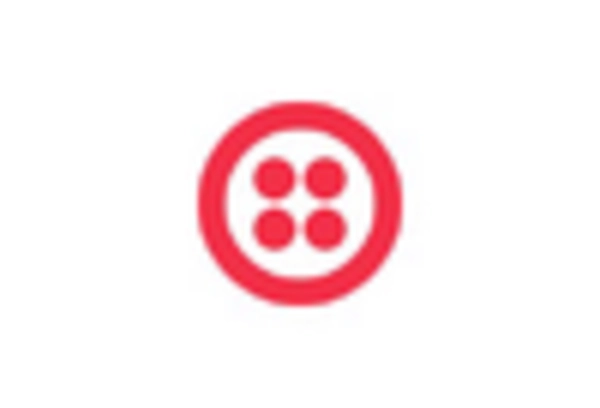Growth of Mobile Payment Systems
The rapid expansion of mobile payment systems in South Korea is significantly impacting the sms firewall market. With the increasing adoption of mobile wallets and payment applications, the volume of SMS transactions has surged. This growth presents a lucrative opportunity for cybercriminals, who may exploit vulnerabilities in these systems. As a result, businesses are recognizing the need for enhanced security measures to protect sensitive financial information transmitted via SMS. The The market is likely to benefit from this trend., as organizations seek to implement solutions that can secure mobile transactions and mitigate risks associated with fraud. The market is projected to grow by approximately 25% over the next five years, driven by the demand for secure mobile payment solutions.
Increasing Cybersecurity Threats
The sms firewall market is experiencing growth due to the rising incidence of cybersecurity threats in South Korea. As businesses and individuals increasingly rely on mobile communication, the potential for SMS-based attacks, such as phishing and spam, has escalated. Reports indicate that SMS phishing attempts have surged by over 30% in recent years, prompting organizations to seek robust security solutions. This trend highlights the necessity for advanced sms firewalls that can effectively filter and block malicious messages. The increasing awareness of these threats among consumers and enterprises is driving demand for comprehensive security measures, thereby propelling the sms firewall market forward. Companies are investing in sophisticated technologies to safeguard their communication channels, which is likely to enhance the overall market landscape.
Rising Consumer Awareness of Security
Consumer awareness regarding the importance of security in mobile communications is on the rise in South Korea. As individuals become more informed about potential threats, they are increasingly demanding secure messaging solutions. This shift in consumer behavior is prompting businesses to invest in sms firewalls to meet these expectations. The sms firewall market is likely to expand as organizations recognize the need to protect their customers' data and maintain trust. Surveys indicate that over 60% of consumers are willing to switch to services that offer better security features. This growing demand for secure communication channels is expected to drive innovation and competition within the sms firewall market, leading to the development of more advanced solutions.
Regulatory Pressures for Data Protection
In South Korea, stringent regulations regarding data protection and privacy are influencing the sms firewall market. The Personal Information Protection Act (PIPA) mandates that organizations implement adequate security measures to protect user data. As a result, businesses are compelled to adopt sms firewalls to ensure compliance with these regulations. Non-compliance can lead to hefty fines, which can reach up to 3% of a company's annual revenue. This regulatory environment is fostering a sense of urgency among organizations to invest in sms firewall solutions that not only protect their data but also align with legal requirements. Consequently, the The market is likely to see increased adoption. as companies prioritize compliance and consumer trust.
Technological Advancements in Firewall Solutions
Technological advancements are playing a crucial role in shaping the sms firewall market. Innovations in artificial intelligence and machine learning are enabling the development of more sophisticated firewall solutions that can adapt to evolving threats. These technologies allow for real-time analysis of SMS traffic, enhancing the ability to detect and block malicious messages effectively. As organizations in South Korea seek to stay ahead of cyber threats, the demand for advanced sms firewalls is likely to increase. The market is expected to witness a surge in investment as companies prioritize the integration of cutting-edge technologies into their security frameworks. This trend indicates a promising future for the sms firewall market, as businesses strive to enhance their defenses against increasingly complex cyber threats.
















